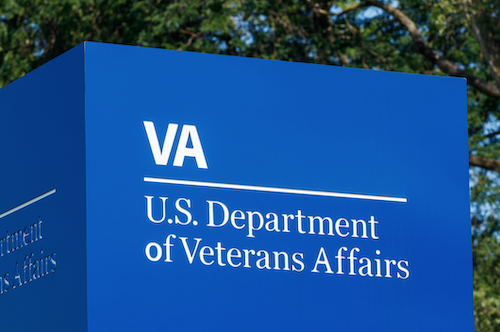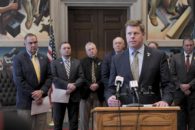Lawmakers and long-term care facility administrators are sounding the alarm after an email from the Department of Veterans Affairs warned veterans could be removed from homes if contractors do not comply with the federal vaccine mandate.
The Biden administration has issued mandates requiring federal employees and contractors, employees at large companies, and health care workers under the Centers for Medicare and Medicaid Services (CMS) umbrella to be vaccinated against COVID-19 by Jan. 18.*
Not every skilled nursing facility in Missouri is contracted with the Department of Veterans Affairs (VA) to pay for the care of a veteran who qualifies for skilled nursing services. Facilities must apply to be a federal contractor with the VA, the department must agree there is a need for such a service, and the facility must pass inspections before they are accepted to be a contractor and be paid to care for a veteran with VA benefits.
If a facility is not approved by the VA to be a federal contractor — or if it loses or forfeits that status — the veteran would either have to move to a facility that is contracted with the VA or use personal, Medicaid, or Medicare funds to remain in their current facility.
In an Oct. 29 email from Paula Galvin, a health care branch chief with VA, guidance was given on how to navigate the new vaccine mandate for contractors.
“Unfortunately if a contractor does not wish to comply with the EO or modification, the only option we have available is to begin the termination process and remove Veterans,” Galvin’s email, provided to The Missouri Times, said.
It was circulated further by a VA contract specialist on Nov. 1, and multiple administrators at long-term care facilities in Missouri confirmed they had received it.
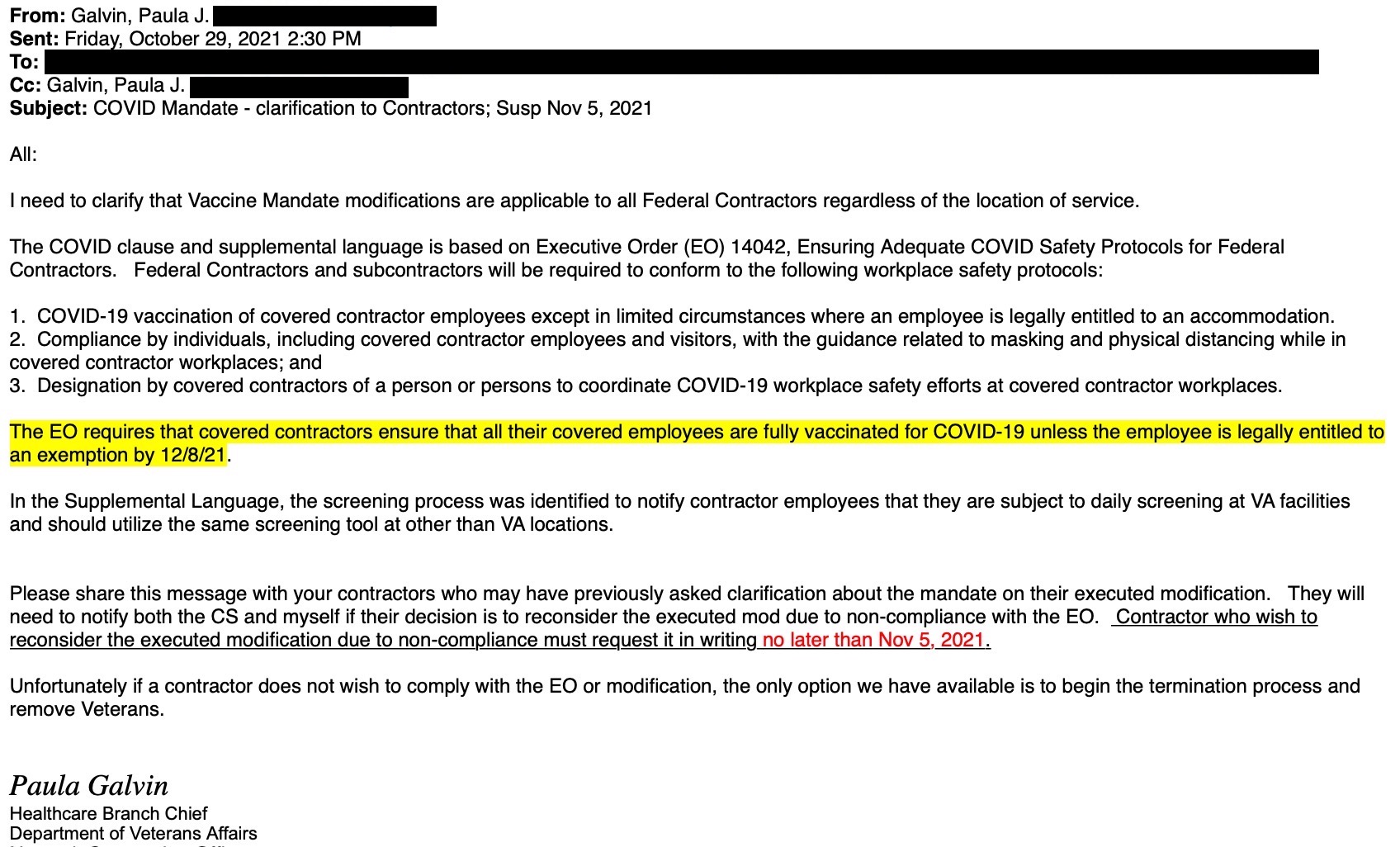
However, a spokesperson for the VA said Friday there is “no determination regarding movement of veterans” until CMS makes a final directive. For now, facilities are being directed to the Safe Federal Workforce FAQ which does not specifically address veterans in long-term care facilities or plans on where they would be placed if removed.
CMS spokespeople were not able to provide comment for this story ahead of its publication.
‘What is the plan?’

Several administrators for long-term care facilities in Missouri spoke to The Missouri Times, both on the record and on background, about issues with workplace shortages and uncertainty over the ins and outs of the mandate.
“We are dealing with a lot of rural workforce issues, beyond the vaccine mandate for all health care workers. It is unimaginable that our federal government would work to evict veterans from skilled care nursing homes, but here we are,” April Hruska, an administrator at the Knox County Nursing Home, told The Missouri Times.
Another nursing home administrator in northern Missouri, who spoke on the condition of anonymity, said the industry has faced a “rough last couple of years.”
“I’m worried about these veterans and their families. I’m just in shock that eviction is on the table for men and women who have served our country,” the administrator said.
The issue has also drawn the attention of lawmakers.
“When the Biden administration first announced vaccine mandates, Gov. Parson immediately vowed to fight this federal overreach — and this is exactly why,” said Kelli Jones, a spokeswoman for Gov. Mike Parson. “Not only may hardworking Missourians lose their livelihoods, now our veterans may go without quality care. This is unacceptable and simply shameful, and the Biden administration should drop this reckless power grab immediately.”
In October, Gov. Mike Parson issued an executive order exempting state employees from COVID-19 vaccine mandates for religious or medical reasons.
“President Biden’s vaccine mandate will result in veterans being evicted from nursing homes. This ruthless disregard for America’s heroes tells you that this administration has but one goal: power,” Sen. Cindy O’Laughlin, a Republican who represents Knox County in the legislature, told The Missouri Times. “They will stop at nothing to achieve it.”
Rep. Bill Hardwick, who represents Fort Leonard Wood, said he’s heard from long-term care workers in his district who are concerned about a worker shortage coupled with what they view as a vague VA directive on veterans’ futures.
“What is the alternative plan for the veterans who will get displaced? It isn’t clear under the new VA guidelines if there are any state or private facilities that would currently qualify which means we have the potential for a lot of Missouri veterans without a place to stay or be taken care of,” Hardwick said. “We certainly need policies that will keep people safe from the spread of infectious diseases — that includes keeping our most at-risk populations safe from COVID — but we need our policies to have some commonsense and be based in medical science, not a heavily-headed political agenda that has a real impact of harming a lot of people.”
Rep. Mike Haffner, a U.S. Navy veteran, said the directive was an “overreach” by the VA.
“The people who are going to get hurt here are the veterans who are trying to get treatment. It’s absurd,” Haffner said.
Attorney General Eric Schmitt, who has sued to stop the vaccine mandates, said the requirements are creating a “ripple effect” of issues, including uncertainty of veterans’ futures at facilities, throughout the health care industry.
“At nursing homes and hospitals, you’re already going to see people leave [over the mandates]. It’s going to create shortages. For folks hailed as heroes last year, now they’re going to be fired,” Schmitt said in an interview.
“Rural hospitals and rural nursing homes, they’re already stretched thin, and if these mandates move through, they will be in a position where they’re not going to be able to provide care for our most vulnerable people, including our veterans,” Schmitt continued. “The consequences of this are just devastating.”
Long-term care in Missouri
There are 1,183 long-term care facilities in Missouri with a combined total of more than 84,000 beds licensed and inspected by the Department of Health and Senior Services (DHSS). Of those facilities, 512 are skilled nursing homes, 23 are intermediate care facilities, 317 are assisted living facilities, 331 are residential care facilities, and eight are long-term care units in hospitals.
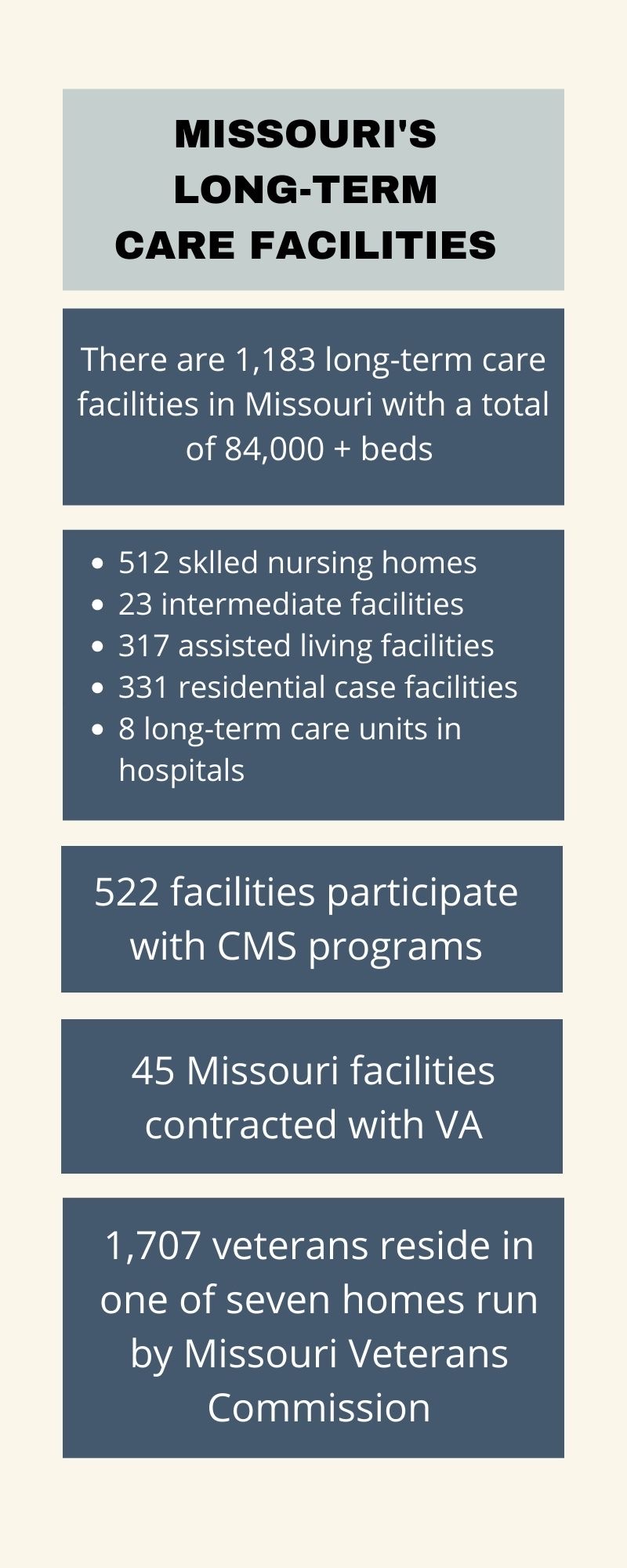
Of those, 522 facilities participate in CMS programs and therefore, must meet federal as well as state standards.
Only 45 long-term care facilities in Missouri are contracted with the VA and are able to accept VA benefits as payment.
In addition, the Missouri Veterans Commission (MVC) oversees seven homes for veterans. As of Nov. 1, 707 veterans were housed in the commission’s homes. The commission does partner with providers and vendors who hold contracts with other entities, including the Centers for Medicare and Medicaid (CMS), a spokesperson told The Missouri Times.
Otherwise, no vaccine mandate is in place for the workers at these homes although the commission “strongly encourage[s] it and make[s] it available” to residents and staff, Aimee Packard, the MVC public information director, said.
Overall, Missouri ranks last in the nation in terms of health care personnel who have completely been vaccinated against COVID-19, according to CMS data.
About 56.7 percent of workers are completely vaccinated in Missouri, compared to 74.4 percent in Illinois, 70.6 percent in Nebraska, 66.8 percent in Kansas, and 57.7 percent in Oklahoma. (Oklahoma ranked just above Missouri.)
In comparison, Puerto Rico and Rhode Island have the highest vaccination rates among their long-term care facility staff workers with 97.4 percent and 96.6 percent respectively.
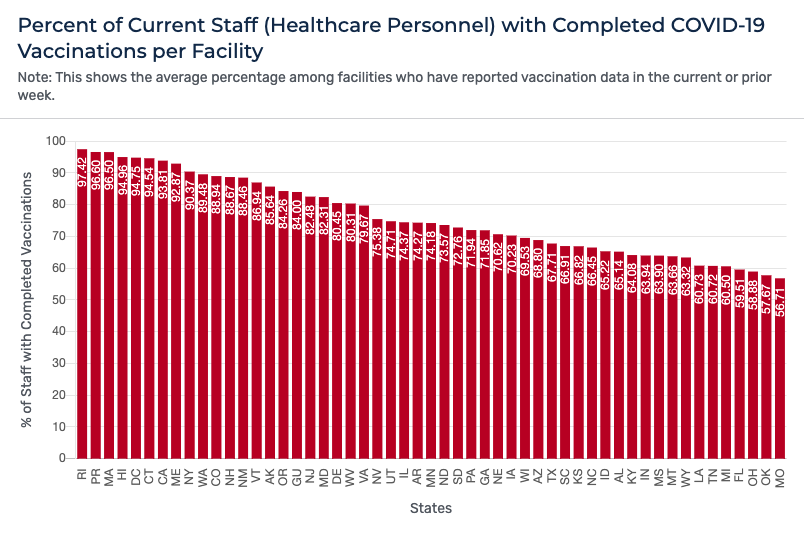
A recent study from the American Health Care Association and National Center for Assisted Living (AHCA/NCAL) found long-term care facilities are facing the worst labor crisis and job losses of any other health care sector. Nationally, employment levels dropped by 14 percent since the start of the COVID-19 pandemic.
As Fox 2 recently reported, nursing homes in Missouri have had to turn away new residents because of staffing shortages.
The Missouri Department of Health and Senior Services (DHSS) issued an emergency rule last week allowing nursing homes to temporarily close their doors due to staffing shortages because of the vaccine mandate for two years or less.
A department spokeswoman said the emergency rule was made “out of an abundance of caution” so it would “have the flexibility to allow homes to temporarily close until they safely resume operation.”
The VA was the first federal agency to mandate COVID-19 vaccinations for its employees in late July.
* While the email sent to long-term care facilities did note a December deadline, it has been extended to Jan. 18.

Kaitlyn Schallhorn was the editor in chief of The Missouri Times from 2020-2022. She joined the newspaper in early 2019 after working as a reporter for Fox News in New York City.
Throughout her career, Kaitlyn has covered political campaigns across the U.S., including the 2016 presidential election, and humanitarian aid efforts in Africa and the Middle East.
She is a native of Missouri who studied journalism at Winthrop University in South Carolina. She is also an alumna of the National Journalism Center in Washington, D.C.
Contact Kaitlyn at kaitlyn@themissouritimes.com.

